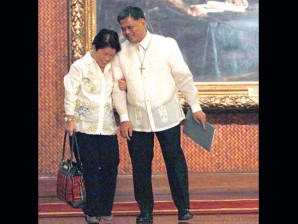
ON THE RIGHT SIDE OF HISTORY Social Welfare Secretary Dinky Soliman and Education Secretary Armin Luistro share a light moment on their way to the historic launch of President Aquino’s flagship K to 12 Program in Malacañang on Tuesday. LYN RILLON
The days of the old basic education program that President Benigno Aquino III likens to “force-feeding” are over.
At the formal launch of his flagship Kindergarten to Year 12 program—commonly referred to as the K to 12 program—in Malacañang Tuesday, Mr. Aquino said it marked the start of a new day for the country’s youth who will now be given a “good opportunity to learn and achieve knowledge.”
To be implemented in phases starting this school year, the K to 12 program will eventually see two years being added to the old four-year high school program.
Universal kindergarten started in school year 2011-2012. The new curriculum for Grades 1 to 7 (high school year 1) will be implemented in the 2012-2013 school year, and progressively carried out in succeeding school years.
Grade 11 (high school year 5) will be introduced in school year 2016-2017. Grade 12 (high school year 6) will be implemented in school year 2017-2018.
1st batch graduates ’18
The first batch of students to go through K to 12 will graduate in March 2018.
A 12-year program is “found to be [the] adequate period for learning under basic education and is a requirement for recognition of professionals abroad,” according to the Department of Education.
“The new curriculum will give each Filipino child the necessary abilities for our century or what they call 21st-century skills,” Education Secretary Armin Luistro said in a speech at the launch of the new program.
Odds against PH
In his speech, the President said the Philippines is the only country in Asia and the third in the world (the two other nations are in Africa) still adhering to a 10-year basic education cycle.
“How can Filipinos compete when they already fall short in the number of years they spend studying in school? Right from the start the odds are already against us,” he said in Filipino.
Mr. Aquino said the 10-year basic education program cycle could be compared to “force-feeding.”
“You will be given 10 years to swallow, chew and to enter into your system all the lessons. There is no chance for students to savor knowledge—it’s really just force-feeding,” he said.
As a result, the information was not being processed well, not being given the proper context, and the implications not better explained, he said.
“That’s why at times [information] enters one ear and leaves the other. In just a few days, lessons are forgotten,” the President said.
‘Vehicle’ to face world
But with the start of the K to 12 program, the education now being given the youth will be of “top quality” and help spur the development of rich and poor alike.
The program will be the “vehicle” for the country to face the world and its challenges, he said.
“Through the K to 12, I am confident that Juan de la Cruz will be able to prosper not only for him and his family but even the nation itself,” he said.
The President said that aside from providing this new kind of basic education in the country, his administration will continue to work to correct the shortcomings of the education system, including building more classrooms, training more teachers and buying more textbooks.
All iPad-based
Mr. Aquino disclosed that the government intends that all reading materials in public schools will eventually be “tablet-based.”
This way, if errors are found in the textbooks “we will just ask the server to make the changes,” he said.
“We do not need anymore to order the recall of many textbooks,” the President said.
Mr. Aquino said Luistro is just waiting for the price of tablet devices to go down further to “meet our target.”
He said the purchase of some of these tablet devices will be covered by the P238.8-billion budget of the education department this year.